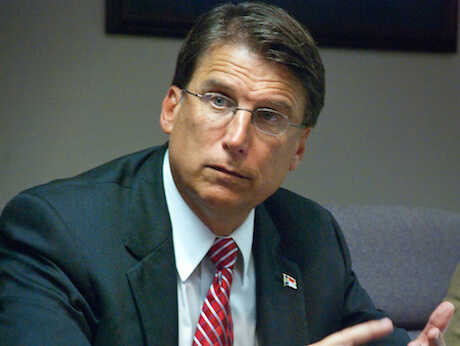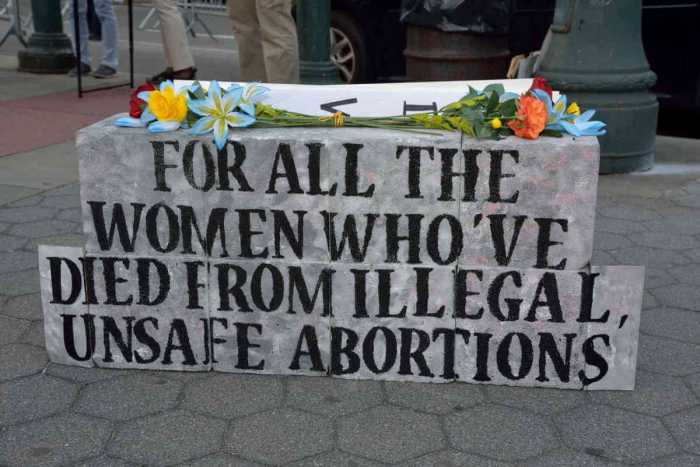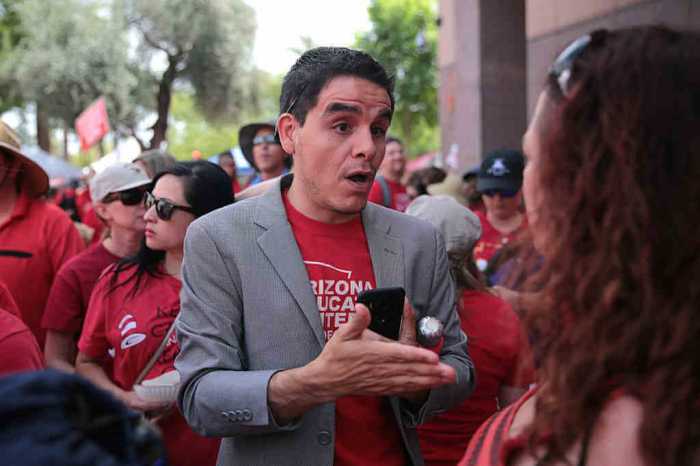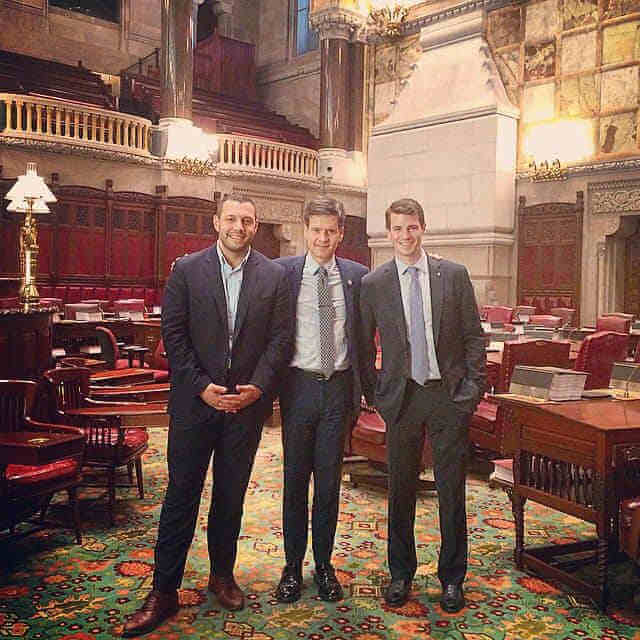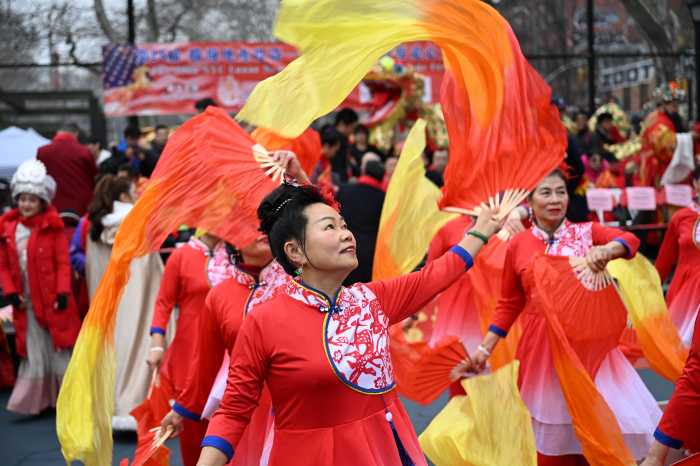Governor Pat McCrory, digging in on defense of North Carolina's “bathroom” law, faces political backlash in his reelection bid.| HAL GOODTREE/ WIKIMEDIA COMMONS
A federal judge has issued a preliminary injunction brought by attorneys for three transgender plaintiffs who are challenging North Carolina’s notorious “bathroom” law, H.B. 2, based on their claim that it violates their rights under Title IX of the 1972 federal Education Amendments Act.
The Richmond-based Fourth Circuit Court of Appeals – under whose jurisdiction the North Carolina court falls – in a ruling in transgender high school student Gavin Grimm’s challenge to Virginia’s Gloucester County School Board, deferred to the Department of Education’s interpretation that Title IX bans gender identity discrimination and requires restroom access for students consistent with their gender identity.
Finding he was bound by the Fourth Circuit decision, District Judge Thomas D. Schroeder, in an August 26 ruling, concluded that the North Carolina plaintiffs had demonstrated a likelihood of success on the merits – a key factor in deciding a motion for preliminary injunction. Though the Supreme Court has since stayed the Fourth Circuit decision, on which the Gloucester School Board is seeking review, Schroeder observed that the high court had not vacated the decision and so it remained precedent in the Fourth Circuit.
District court sides with three transgender plaintiffs in preliminary halt to “bathroom” law
The North Carolina lawsuit arose out of an “emergency” bill rushed through a special session of the legislature in March that aimed to preempt a new civil rights ordinance from taking effect in Charlotte. The law limited nondiscrimination protections in municipalities to those categories protected under state law – which does not bar discrimination based on either sexual orientation or gender identity. Much of the legislative debate focused on provisions of the Charlotte ordinance that would have required all places of public accommodation – in public facilities and private business settings – to allow transgender individuals access to bathroom and locker facilities without discrimination. Stressing their concerns about the privacy and safety of women and children against imagined male predators posing as women, the law’s champions insisted that all government-run facilities, including schools and universities, limit access to bathrooms and locker rooms based on “biological sex” as designated on a person’s birth certificate. The requirement that private businesses offer their public accommodations to transgender people without discrimination was also overridden in the new law, though of course private businesses could respect the rights of transgender customers if they so chose.
A furious round of litigation ensued after the measure’s hasty adoption, with cases brought in two of the three North Carolina federal districts by a variety of plaintiffs, including the three individuals in this case, students and employees of the University of North Carolina represented by the American Civil Liberties Union of North Carolina and Lambda Legal.
Despite widespread condemnation and boycotts, including the NBA’s decision to pull its 2017 All Star Game from Charlotte, Governor Pat McCrory – now struggling in his reelection campaign – and Republican state legislative leaders have dug in, suing the federal government, seeking declaratory judgments that H.B. 2 does not violate federal sex discrimination laws. The US Justice Department, meanwhile, has sued the state officials, seeking a declaration that H.B. 2 does violate both federal sex discrimination laws and the US Constitution.
Alliance Defending Freedom, a Christian law firm that opposes LGBT rights advances nationwide, has sued on behalf of parents and students challenging the validity of the Justice Department and the Department of Education’s adoption of guidelines requiring that schools comply with their interpretation of Title IX.
Judge Schroeder’s ruling responded solely to the plaintiffs’ motion for preliminary relief in their case against UNC, Governor Pat McCrory and other state officials, including Attorney General Roy Cooper, the Democratic candidate for governor who is refusing to defend H.B. 2. McCrory hired outside counsel to defend the state’s position.
Reaction from the university to H.B. 2’s enactment has been curious to watch. Initially, its president, Margaret Spellings, announced that UNC was bound by the state law and would comply with it. Then, after a storm of criticism and the filing of lawsuits, she pointed out that the law has no enforcement provisions and that the university would not actively enforce it. That led the state to argue there was no need for an injunction since UNC was doing nothing to interfere with the three plaintiffs’ use of restroom facilities.
Schroeder rejected this argument, pointing out that “UNC’s pronouncements are sufficient to establish a justiciable case or controversy. The university has repeatedly indicated that it will – indeed, it must – comply with state law. Although UNC has not changed the words and symbols on its sex-segregated facilities, the meaning of those words and symbols has changed as a result of [the bathroom provisions], and UNC has no legal authority to tell its students or employees otherwise.” Schroeder continued, “The sex-segregated signs deny permission to those whose birth certificates fail to identify them as a match. UNC can avoid this result only by either (1) openly defying the law, which it has no legal authority to do, or (2) ordering that all bathrooms, showers, and other similar facilities on its campuses be designated as single occupancy, gender-neutral facilities. Understandably, UNC has chosen to do neither.”
Since UNC has not expressly given transgender students and staff permission to use facilities consistent with their gender identity and has acknowledged that H.B. 2 is “the law of the state,” Schroeder said there is a live legal controversy about which a preliminary injunction in appropriate.
Schroeder’s key factual finding was that the state failed to show that allowing transgender people to use restroom facilities consistent with their gender identity posed any significant risk of harm to other users of those facilities, and he also found little support for the state’s privacy claims. The state, he suggested, has been lax in providing any factual basis for its safety and privacy claims and even failed until rather late in the process to provide a transcript of the legislative proceedings, leaving the court in the dark about the stated purposes of H.B. 2’s bathroom provision.
Schroeder also pointed out that North Carolina has long had criminal laws in place that would protect the safety and privacy interests of people using public restroom facilities. While concluding that the state could not demonstrate any real harm in having the injunction issued, the harm to the plaintiffs in keeping the bathroom provision in place was real and significant.
Schroeder did not base his ruling on 14th Amendment equal protection and due process claims asserted by the plaintiffs, which he found less well developed than their Title IX claims. Even invoking heightened judicial scrutiny to any claim of sex discrimination under H.B. 2, he concluded, might not be sufficient to overcome Fourth Circuit precedents about North Carolina’s legitimate interest in protecting the individual privacy of users of public restroom facilities. Other cases underway in North Carolina may yet accept a 14th Amendment claim against the new state law.
Judge Schroeder explained that his injunction directly protects only the three plaintiffs and not all transgender students and staff at UNC, a point that prompted Lambda Legal, on August 29, to announce it would seek to have it broadened.
“The current complaint asserts no claim for class relief or any Title IX claim by ACLU-NC on behalf of its members,” he wrote. “Consequently, the relief granted now is as to the individual transgender Plaintiffs.”
Regardless of that caveat, UNC is now on notice that any action to exclude transgender students or staff from restroom facilities consistent with their gender identity is a likely violation of Title IX. That will, no doubt, deter the university from any enforcement efforts, which it has eschewed in any event.
Schroeder was appointed to the federal court in 2007 by President George W. Bush.

